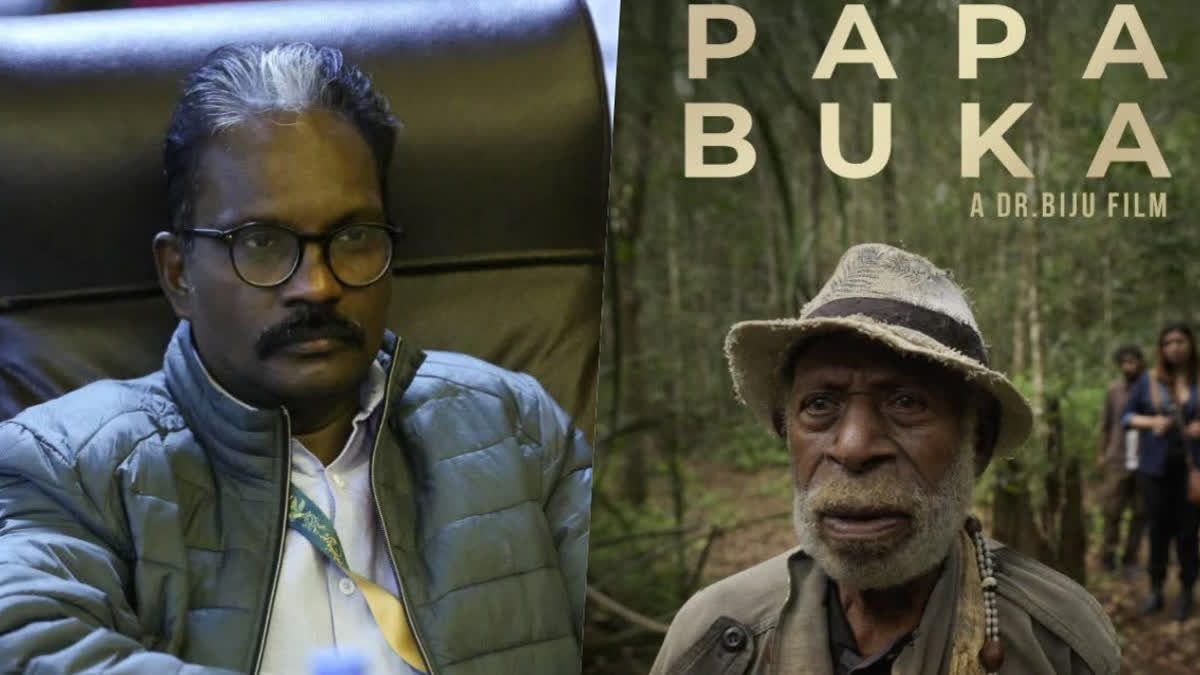INTERVIEW | Dr Biju On Papa Buka, Shooting Amid Venomous Snakes, Casting 85-Year-Old Debutant, And Road To The Oscars

8/30/2025, 10:42:27 AM
Hyderabad: National Award-winning and internationally acclaimed Malayalam filmmaker Dr Biju has once again placed Indian cinema on the global stage. His latest work, Papa Buka, has been officially selected as Papua New Guinea's entry for the Oscars. The film, an India-Papua New Guinea co-production, not only marks a rare cross-cultural cinematic collaboration but also carries a unique story both on screen and behind the scenes. In an exclusive conversation with ETV Bharat, Dr Biju shared insights into the making of the film, the challenges of shooting in unfamiliar territory, and the extraordinary life of the film's 85-year-old protagonist. The journey of Papa Buka began nearly four years ago with the idea of creating a joint India-Papua New Guinea project. But the road was far from smooth. "Several story ideas had to be abandoned due to diplomatic challenges before Papa Buka finally took shape," Dr Biju said. The project was first initiated by NAS, a production company in Papua New Guinea. Soon after, prominent Indian names came on board, including filmmaker Pa Ranjith, actor-producer Prakash Bare, and Odisha-based producer Akshay Kumar Parija. Given its status as a bi-national project, the film had to tread carefully with its script. "Since this film was being produced by two countries, it was important that not a single reference in the story created controversy. We were in continuous communication with the embassies of both nations while making the film," he said. The month-long shoot in Papua New Guinea became a learning curve for the entire team. "Many of the stories about Papua New Guinea are exaggerated. During the 30 days we spent there, I found the people to be extremely warm and cooperative," Dr Biju said. But filming in the region's dense forests was not without its dangers. "The only real challenge we faced was the fear of venomous snakes, as we were filming in forests that are home to some of the world's most poisonous snakes. Apart from that, the only difficulty was the constantly changing weather," he added. Despite not having a fully established film industry, Papua New Guinea supports cinema through its National Cultural Commission and film institutes, which became key resources for the project. Perhaps the most extraordinary aspect of Papa Buka is its lead actor. The protagonist is played by Sine Boboro, an 85-year-old tribal chief who had never watched a film before, let alone acted in one. "Life had never taken him to a cinema hall or in front of a camera. Yet he played the central character with authenticity and grace," said Dr Biju. Sine portrays a guide who helps two Indian researchers uncover stories about Indian soldiers who had reached Papua New Guinea during World War II. Alongside Sine, Indian actors Rituparna Chattopadhyay and Prakash Bare play key roles, while 25 local residents also feature in supporting parts. The director revealed that Sine often shared his memories of World War II bombings during the filming. "He would recall events that took place decades ago as if they had happened yesterday," Biju shared. As in many of his films, Dr Biju has placed nature at the heart of Papa Buka. For him, landscapes are never just backdrops; they are characters in their own right. "Human beings must learn to live in harmony with nature; that is the law of the world," he said. The cinematography of Papa Buka carries a personal touch for the director as well. Dr Biju shared his long-standing bond with the late cinematographer MJ Radhakrishnan, who had worked on most of his earlier films. "Radhakrishnan was more than a cameraman to me; he was a close friend. After his death, his son Yadu Radhakrishnan stepped in, and he has been behind the camera for Papa Buka and my other recent works," the filmmaker said. Unlike many arthouse directors, Dr Biju holds no disdain for commercial cinema. "I enjoy watching and appreciating them," he said. However, when it comes to directing, he chooses to follow his instincts. He also believes that filmmakers must speak their minds. "It is an artist's duty to respond to what is happening in society. If we remain silent, it means we are shirking our responsibility toward society," he stated. Dr Biju also shed light on the Oscar selection process, which he described as both competitive and costly. "All non-Hollywood films compete in the Best International Feature Film category, and each country can nominate one film. About 85 countries submit their entries," he said. The final selection involves multiple stages: an initial shortlist of 15 films, from which a smaller group is chosen, and finally one winner. He pointed out the influence of marketing in this process. "Massive promotional campaigns costing millions are often required to get the attention of jury members. Without strong marketing, a film may never reach the jury's radar," he added.